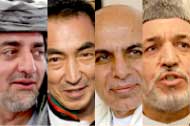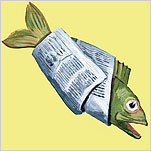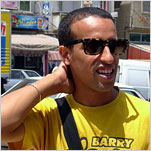KABUL, Afghanistan — The Taliban and the Afghan government escalated a war of attrition and propaganda on Tuesday, two days before the presidential election, with the Taliban unleashing suicide bombings and a rocket assault at the presidential palace and the government barring news organizations from reporting on election day violence.
Notes from Afghanistan, Pakistan, Iraq and other areas of conflict in the post-9/11 era. Go to the Blog »
The attacks, aimed at the heart of the capital and the workplace of President Hamid Karzai, provided yet another indication of the insurgents’ determination to keep people away from the polls and undermine Thursday’s election, which has become a critical test for the Afghan government and its foreign backers.
Early Wednesday, gunmen seized control of a bank in downtown Kabul. The police said three were killed in a shootout. Officers at the scene said it was unclear who they were, but said the intensity of the fighting indicated they were more than common robbers.
In recent days the Taliban have issued repeated warnings — the most recent e-mailed to reporters by a spokesman on Monday — that they will attack polling stations and punish those who turn out to cast ballots. The insurgents carried out two suicide car bombings and rocket attacks on the capital over the last two days, to create a sense of fear to keep voters at home.
In the worst of the attacks on Tuesday, at least eight people were killed in a suicide car bombing in Kabul, including a NATO soldier and two Afghans working for the United Nations mission, officials said. More than 50 people were wounded, they said.
Of the rockets that hit Kabul about 7 a.m. Tuesday, one landed on the grounds of the presidential palace, where President Karzai had started work half an hour before, his spokesman said. Another hit a police station. No one was wounded by the rockets, officials said, but the audacity of the attacks demonstrated the power of the Taliban to disrupt and intimidate.
In another attack on Tuesday morning, in the southern province of Oruzgan, a suicide bomber walked up to an Afghan National Army checkpoint and detonated his explosive vest, killing three soldiers and two civilians, according to the provincial police chief, Juma Gul Himat.
The government, meanwhile, has urged people not to be deterred and to come out and vote on Thursday in presidential and provincial council elections.
“Such kind of attacks shows that the enemies want to disrupt the election process, but we ask people to exercise their right of participation in the elections with strong will,” the presidential spokesman, Homayun Hamidzada, said at a news briefing.
“They will try to attack polling stations and intimidate people, but we are working hard in close coordination with ISAF and other international security forces, as well as with the Independent Electoral Commission to maintain security,” he said, referring to the NATO-led International Security Assistance Force.
Later, the Afghan Foreign Affairs Ministry issued a statement asking all domestic and international news agencies to refrain from reporting any violent attacks between 6 a.m. and 8 p.m. on election day.
The National Security Council had made the decision “in view of the need to ensure the wide participation of the Afghan people in upcoming presidential and provincial council elections, and prevent any election-related terrorist violence,” the statement said.
The government is concerned that a show of force by the Taliban and low turnout will undermine the credibility of the elections. Low turnout, especially in the war-torn south, could affect Mr. Karzai’s results in the election, since the ethnic Pashtuns who populate the south form his base of support.
Yet the Taliban have been stepping up their campaign against the elections. In an e-mailed statement Tuesday, sent by a spokesman, Zabiullah Mujahed, the movement denied that any agreements had been made with the government to allow elections to take place. It described talk of peace deals as a “cunning trick” by the government and foreign forces.
The intimidation campaign seemed to be working. Local television stations were reporting Tuesday that shop owners in Kabul and in the eastern city of Khost were already closing their shops in fear of attacks or other violence over the elections.
The toll from the suicide bombing in Kabul was also high. One witness said he saw a white car race after a British military logistics convoy and explode as it slammed into it.
“Suddenly we heard a very loud bomb, and a big cloud of dust rose from where the attack happened,” said Ghulam Muhammad, 22, who saw the car from his vegetable store. “The explosion was huge, and I could see many people lying on the road.”
Seven Afghan civilians were killed and 51 were wounded, all civilians, the head of the police criminal investigation department, Sayed Abdul Ghafar, said at the scene. Eighteen cars were set on fire by the explosion and shops and stalls were damaged, he said.
The attack occurred just off the main road leading east out of the capital to Jalalabad. A statement from the international security forces said one foreign soldier was killed and two others were wounded in the attack. A statement from Afghanistan’s Interior Ministry said 7 civilians were killed and 53 wounded.
The United Nations confirmed that two of its Afghan staff members were among those killed.
Shortly before the explosion, NATO-led forces said they would suspend offensive operations on election day, and instead deploy coalition and Afghan troops to protect voters, election monitors and polling stations.
“In support of the Afghan National Security Forces who lead the security efforts during the electoral process, only those operations that are deemed necessary to protect the population will be conducted on that day,” they said in a statement.













